originally posted at https://canmom.tumblr.com/post/163681...
So last time we established, in a rather roundabout way, that portrayals of magic in the narration can be regarded as hypotheticals, to be evaluated on the basis of physical evidence. That shuts down Beatrice’s ability to wow us with SFX and expect us to just believe that’s how it went down. Of course, we had to be already assuming some form of this, or we’d have folded long ago.
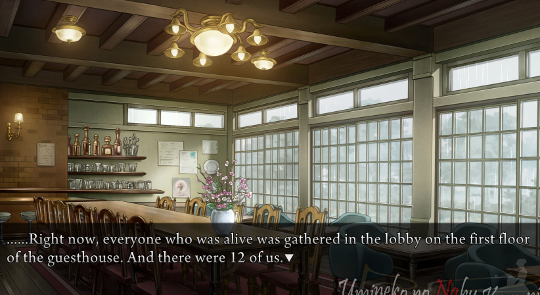
We join the kids, grieving the deaths of the servants and Kinzo.
This time, they have four rifles rather than one, distributed between Krauss, Eva, Rudolf and Rosa. Kinzo was once again found in the furnace. They wonder if it might be a substitute body of another person with polydactyly.
We quickly summarise the usual situation: the bodies of the five servants were placed in various rooms, and Kinzo in the boiler room. The telephones have been cut.
Beatrice has written them an additional letter, telling them that there’s no point trying to catch her and they had best focus their efforts on the riddle.
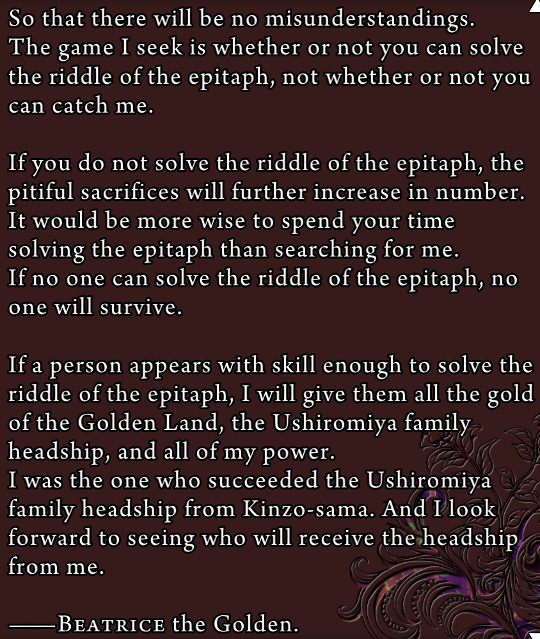
So that there will be no misunderstandings. The game I seek is whether or not you can solve the riddle of the epitaph, not whether or not you can catch me.
If you do not solve the riddle of the epitaph, the pitiful sacrifices will further increase in number. It would be more wise to spend your time solving the epitaph than searching for me. If no one can solve the riddle of the epitaph, no one will survive.
If a person appears with skill enough to solve the riddle of the epitaph, I will give them all the gold of the Golden Land, the Ushiromiya family headship, and all of my power.
I was the one who succeeded the Ushiromiya family headship from Kinzo-sama. And I look forward to seeing who will receive the headship from me.
—Beatrice the Golden.
So, they’re not wasting time on wild accusations or searches for the culprit, just holing up in a room with guns and waiting for the police.
Meta!Battler steps in to comment. He’s talking to Virgilia again. Virgilia says Beatrice most likely killed the people Battler would find easiest to suspect, i.e. he’s left to suspect either Nanjo or his family members.
Virgilia tells him to anticipate a frontal attack, i.e., take the remaining ‘pieces’ and descend as a 19th person who shouldn’t exist. She says that deception is a witch’s strongest point, but what Beatrice says will never threaten the truth Battler believes in.
Rather than just occasionally offering advice, Virgilia has joined Battler’s team openly. Beatrice says she’s not worried about the ‘old classics’ that Virgilia has as moves. Sure, says Virgilia, show me the new tricks. Beatrice taunts Battler for relying on a witch advisor.
An entirely new track kicks in, as Battler and Virgilia present the known information.
- Sayo was found on the first-floor parlour with locked doors and windows.
We establish a semi-formal definition of locked rooms.

Beatrice names this as “Beatrice’s locked room definition”. For simplicity, we’ll call that the BLRD. Battler asks for clarification on ‘interference’, and Beatrice says there are no gaps for long thin rods and fishing lines. When prodded, Beatrice adds that it’s impossible for radio waves or other forms of remote control to enter the room as well. The phone lines also don’t work.
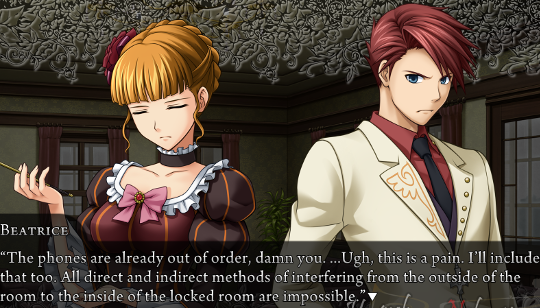
The only exception is sound-based communication: knocks or voices may or may not pass in and out of a locked room.
On with the facts.
- Sayo had a master key.
In red, Beatrice confirms: there are five master keys, one for each servant.
We also learn…
- Sayo’s body had a sealed envelope containing the key to the second-floor guest room.
We get confirmation each room had one additional room-specific key, in addition to the master keys.
- The second-floor guest room satisfied BLRD, and contained Kumasawa’s body, her master key, and an envelope with the key to the third-floor waiting room.
- The third-floor waiting room satisfied BLRD, and contained Gohda’s body, his master key, and an envelope with the key to the second-floor VIP room.
- The second-floor VIP room satisfied BLRD, and contained Genji’s body, his master key, and an envelope with the key to the underground boiler room.
- The underground boiler room satisfied BLRD, and contained Kinzo’s body, his master key, and an envelope with the key to the chapel. It also contained Beatrice’s letter encouraging the relatives to solve the riddle.
- The chapel satisfied BLRD, and contained Kanon’s body, his master key, and an envelope with the key to the first-floor parlour.
So, in short, we have a perfect loop. The game provides an illustration.
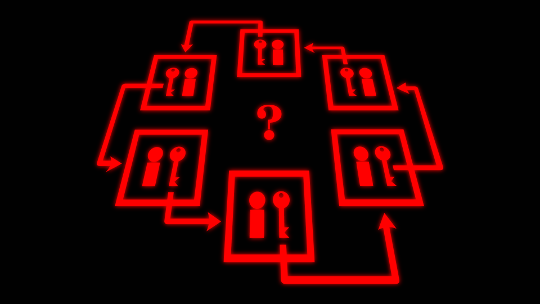
So there are some questions. Do all the rooms really satisfy BLRD? We want that in red. Failing that, how difficult would it be to make a duplicate of the key?
Redtext: Furthermore, all the doors and windows in the six rooms are normal. No device exists which can lock them without a key, such as an auto-lock.
Hold on a minute… in the first game, didn’t we establish there was an exit from the boiler room to the inner courtyard that couldn’t be locked? Wouldn’t that violate BLRD?
Battler and Virgilia start discussing possibilities. Battler suggests someone might just be playing dead. Virgilia says Nanjo checked the bodies, and confirmed all the deaths, but the Devil’s Proof says it’s not impossible he was wrong. Battler speculates that redtext might cut this down. They’re having a great time and Beatrice feels left out.
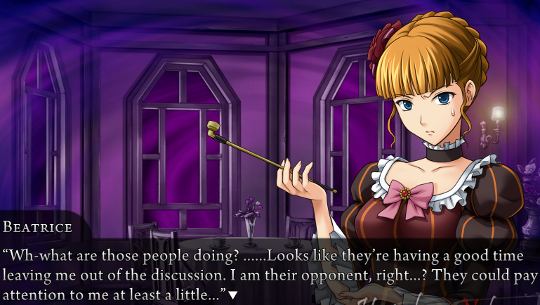
She actually zones out for Battler’s first repetition request. But we do indeed get that hypothesis shot down: Kinzo, Genji, Shannon, Kanon, Gohda and Kumasawa - these six are all dead.
Next: There is no one hiding in the six rooms.
Battler spots another possibility, one I didn’t consider.
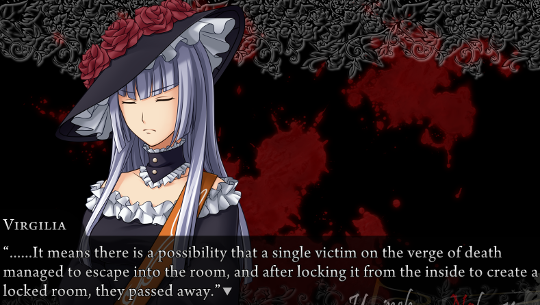
Beatrice repeats the six died instantly, meaning as soon as they were attacked, they became incapable of action.
Battler says, having now ruled out standard tricks, he can start more serious possibilities. He proposes traps could have been set in the locked rooms, that trigger after the doors are locked. Beatrice demands he explain the nature of the traps, Battler and Virgilia appeal to the Devil’s Proof.
Beatrice redtexts it. The six were not killed by traps. “A trap is something that activates when a victim gets caught in it by their own actions.” That leaves timers… ah, but no, she also rules out remote control and timers. Ronove refines the definition to ‘without direct participation by the person who set it up’.
Beatrice seems surprisingly offput by this attack, and Battler picks up on it.
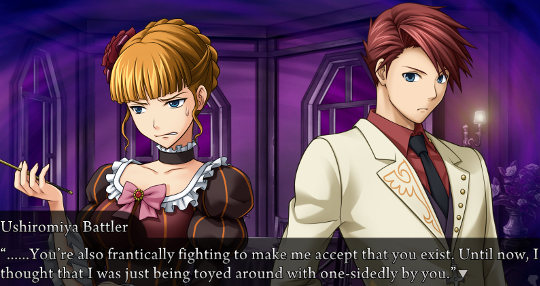
Battler comments on Beatrice’s strategy, of showing some magic - ‘rushing him’ as Virgilia puts it - when he’s seen all his hypotheses have just been rejected and victory is in sight. This, he says, would once have defeated him. But no more.
Because, he wouldn’t be Battler if he didn’t…
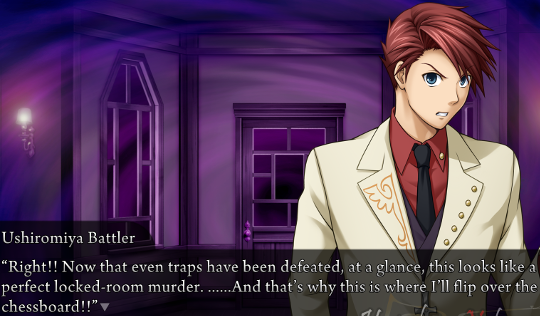
…FLIP THE CHESSBOARD!
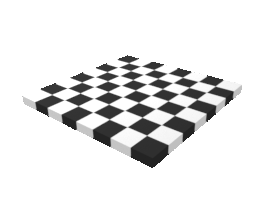
What he means by this is proposing it was a murder-suicide. The culprit killed five people, locked themselves in the final room, and committed suicide. My guess: most likely Kinzo.
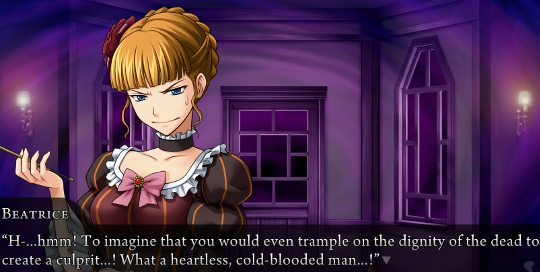
Of all the people to level such an accusation. Battler calls her on it, bringing up how she treated Kanon.
He requests repetition not of “none of the deaths were suicides” since that won’t “corner” her, but of “all of the deaths were homicides”. I guess that also rules out accidents?
Beatrice declines this one for “no reason in particular”. Curious. When Battler declares checkmate, she declares none of the six committed suicide. Note that still leaves out accidents.
Ah, but I see the issue. In her narrative, Kumasawa/Virgilia was killed by the towers, not a human, so it wasn’t a homicide - except that Beatrice set the towers in motion, so it probably should still count if Beatrice counts as a human here. Additionally, the Seven Sisters of Purgatory may or may not count as human. Finally, it’s not exactly clear why Kinzo caught fire.
Virgilia points out the modification. Battler follows it through, and declares the culprit died by accident. Beatrice jumps to redtext against that, but Ronove interrupts her and covers her mouth(!) to request a strategy break.
Honestly, what happened to Lambdadelta and Bernkastel?
As Beatrice calls off, Virgilia says Beatrice was, in her haste to remove the check, about to accidentally let ‘several large pieces’ go. Let me try and follow it through. If we knew none of the six died by accident or suicide… that would leave homicide, or death by nonhuman agency (’magic’). Wouldn’t that be to Beatrice’s advantage? Why would it be useful to Beatrice later to say that one or more of the six died by accident? Would it overly constrain her magical explanations? I guess we’ll have to see how she uses it later.
The next chapter is called The Key to the Golden Land.
Comments